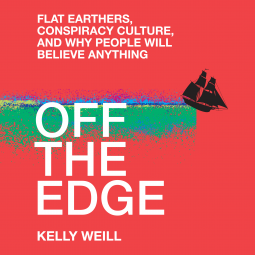Off the Edge
Flat Earthers, Conspiracy Culture, and Why People Will Believe Anything
by Kelly Weill
Narrated by Xe Sands
You must sign in to see if this title is available for request. Sign In or Register Now
Send NetGalley books directly to your Kindle or Kindle app
1
To read on a Kindle or Kindle app, please add kindle@netgalley.com as an approved email address to receive files in your Amazon account. Click here for step-by-step instructions.
2
Also find your Kindle email address within your Amazon account, and enter it here.
Pub Date Feb 22 2022 | Archive Date Not set
Workman Audio | Algonquin Books
Talking about this book? Use #OfftheEdge #NetGalley. More hashtag tips!
Description
Since 2015, there has been a spectacular boom in a nearly two-hundred-year-old delusion—the idea that we all live on a flat plane, under a solid dome, ringed by an impossible wall of ice. It is the ultimate in conspiracy theories, a wholesale rejection of everything we know to be true about the world in which we live. Where did this idea come from? Weill draws a straight line from today’s conspiratorial moment back to the early days of Flat Earth theory in the 1830s, showing the human impulses behind divergences in belief. Faced with a complicated world out of our individual control, we naturally seek patterns to explain the inexplicable. The only difference between then and now? Social media. And, powered by Facebook and YouTube algorithms, the Flat Earth movement is growing.
At once a definitive history of the movement and a readable look at its expansive, absurd, and dangerous present, Off the Edge introduces us to a cast of larger-than-life characters, from 19th-century grifters to 20th-century small-town tyrants to the provocateurs of Alex Jones’s early-aughts internet, whose rancor sowed the early seeds of our modern division. We accompany Weill to Flat Earther conferences, where we meet moms on vacation, determined creationists, scammy YouTube celebrities and their victims, neo-Nazi rappers, and even a man determined to fly into space in a homemade rocket-powered balloon—whose tragic death proves as senseless and absurd as the theory he set out to prove.
Incisive and clear-eyed, Off the Edge tells a powerful story about belief, exploring how we arrived at this moment of polarized realities and explaining what needs to happen so that we might all return to the same spinning globe.
Advance Praise
"This provocative book is sure to inspire debate about conspiracy theories as well as how citizens of a fractured world can learn to overcome their fear of radical planetary change. A timely and disturbing study of flawed, dangerous thinking."
—Kirkus Reviews
"Insightful and surprisingly empathetic . . . an illuminating take on a much scrutinized subject."
—Publishers Weekly
"An inquisitive, empathetic, deeply reported, and disturbingly funny tour through the furthest reaches of the most fringe possible conspiracy community. While Weill's subjects frequently risk falling off the edge of their own self-created map of the known universe, she follows them deftly to the brink, showing what their delusional explorations can teach us about belief, community, and the long history of pseudoscience around (sorry!) the world."
—Anna Merlan, author of Republic of Lies
"In this delightful deep dive into flat earth culture past and present, taking in YouTube recommendation algorithms, amateur rocketry, and a rat’s nest of conspiracy theories, Kelly Weill explains why, after several millennia of setbacks, the idea that the earth is flat is burgeoning once again."
—Michael Strevens, author of The Knowledge Machine
Available Editions
| EDITION | Audiobook, Unabridged |
| ISBN | 9781649040800 |
| PRICE | $23.95 (USD) |
| DURATION | 7 Hours, 27 Minutes, 19 Seconds |
Available on NetGalley
Average rating from 5 members
Featured Reviews
This audiobook was pretty interesting and gave a general history of the flat-earth conspiracy from its origins at the time of Charles Darwin to present-day flat-earth movements. I found the first couple of chapters about Alfred Wallace (who also proposed evolution) and his frustration in proving the first flat-earther to be the most interesting.
I will say that I think the inclusion of other conspiracy theories like Trump losing the election felt a bit out of place, even if the author did try to place them in relation with flat-earth.
Overall, this was an interesting dive into the flat-earth world. I appreciated that Weill acknowledged these people as some that cannot change their thinking, AND as some people she considered to be friends even though she knows they are ultimately wrong in their beliefs. Weill's own experiences at flat-earth conferences and with flat-earth friends also added that extra something and heightened her ability to represent both sides of the argument.
Thank you Netgalley + Workman Audio for this copy.
 Elizabeth H, Media/Journalist
Elizabeth H, Media/Journalist
I’m fascinated by conspiracy theories — how they develop, why people believe them, how they spread. In Off the Edge, journalist Kelly Weill uses the rise of the flat Earth movement to illuminate how wild ideas catch on.
Off The Edge begins with an exploration of the early days of the flat Earth conspiracy. In the 1830s, a charlatan selling miracle cures, Samuel Birley Rowbotham, became convinced the Earth was a plane. Fast forward nearly 200 years, and flat Earthers are still running their own investigations, attempting to prove their belief is fact. The movement is now in the midst of a social-media-fueled boom, with its own influencers, conferences and more, and is increasingly becoming enmeshed with the Qanon conspiracy theory and neo-Nazism.
My favorite parts of Off the Edge were the profiles of conspiracists who explain exactly how they started to believe the Earth was flat. For almost all of them, it started with YouTube, as the video site suggested flat Earth clips after viewers watched content about geography or space. Weill writes with empathy and is careful not to depict her subjects as crazy. I particularly appreciated her willingness to consider if she had bolstered the movement by giving it attention as a reporter, ultimately concluding that reporting about flat Earth is critical for us to understand conspiracy thought.
Readers who liked this book also liked:
Silvia Moreno-Garcia
Historical Fiction, Literary Fiction, Sci Fi & Fantasy












